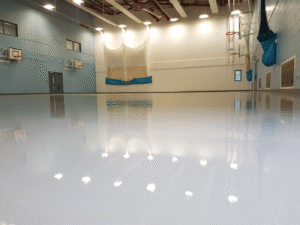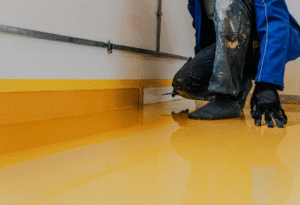When it comes to choosing the right flooring for your property—be it a home, garage, commercial unit, or industrial facility—there are a myriad of options to consider. Among the most popular in recent years is epoxy flooring, known for its sleek appearance, incredible durability, and resistance to wear and chemicals. But is epoxy flooring good or bad? At Resinate Flooring, we’ve helped countless clients make informed flooring choices, and in this post, we’ll break down everything you need to know about epoxy flooring—its pros, cons, and whether it’s right for your space.
What Is Epoxy Flooring?
Epoxy flooring is a surface coating made by mixing resin and a hardener, which together form a rigid, plastic-like material that bonds tightly to concrete surfaces. The result is a seamless, high-gloss finish that’s both decorative and highly protective. It’s widely used in garages, commercial kitchens, warehouses, showrooms, and even residential interiors where durability and clean aesthetics are essential.
The Pros of Epoxy Flooring
1. Durability and Strength
One of the standout benefits of epoxy flooring is its exceptional durability. It withstands heavy footfall, machinery, and vehicle traffic without cracking or chipping. For industrial settings or garage floors, this makes epoxy an ideal long-term investment.
2. Chemical and Stain Resistance
Epoxy floors are resistant to oils, fuels, cleaning agents, and other harsh chemicals. This feature makes them a favourite in automotive and chemical manufacturing sectors, as well as domestic garages and kitchens.
3. Low Maintenance
Unlike traditional flooring materials such as tiles or bare concrete, epoxy floors are incredibly easy to clean. A simple mop or brush is usually all that’s needed to maintain the floor’s glossy appearance.
4. Aesthetic Appeal
Epoxy flooring isn’t just practical—it looks good too. With a wide range of colours, patterns, and finishes available, including metallic and flake designs, epoxy flooring can add a modern, polished look to any space.
5. Cost-Effective Over Time
Although the initial installation may seem costly, epoxy flooring offers excellent value in the long run due to its longevity and minimal maintenance costs.
6. Safety Enhancements
Anti-slip additives can be incorporated into the epoxy mix to increase grip and reduce the risk of accidents in wet or high-traffic environments.
The Cons of Epoxy Flooring
1. Installation Challenges
Proper installation is crucial. If not done by a professional, epoxy flooring can bubble, crack, or peel. At Resinate Flooring, our expert installers ensure that the concrete base is properly prepared and that each coat is applied flawlessly.
2. Slippery When Wet
Although additives can be used to improve traction, untreated epoxy surfaces can become slippery when exposed to water or oils.
3. Curing Time
Epoxy flooring isn’t a quick fix. Depending on the size of the area and the number of coats applied, it can take several days to fully cure and be ready for use.
4. Not Ideal for All Environments
Epoxy flooring may yellow or discolour when exposed to prolonged UV light unless a UV-resistant topcoat is used. For outdoor spaces or sunlit rooms, additional coatings are advised.
5. Removal Can Be Difficult
Once set, epoxy adheres strongly to the concrete base. If you ever wish to remove it or switch flooring types, the process can be labour-intensive and expensive.
Where Epoxy Flooring Excels
Epoxy flooring is particularly well-suited to:
- Garages: Resistant to oil stains and vehicle wear.
- Commercial Kitchens: Easy to clean and sanitise.
- Retail Spaces: Attractive and durable under constant foot traffic.
- Warehouses: Strong enough for heavy machinery and forklifts.
- Hospitals & Clinics: Seamless and hygienic.
If you’re planning a flooring upgrade in any of these settings, professional epoxy floor installation is certainly worth considering.
Where It Might Not Be Ideal
- Outdoor spaces exposed to strong sunlight or rainfall may need alternative coatings.
- Temporary setups or rented spaces where removability is key.
- Uneven or unstable subfloors that are prone to shifting.
How Long Does Epoxy Flooring Last?
With proper installation and maintenance, epoxy floors can last anywhere from 10 to 20 years in commercial or residential settings. Industrial settings may experience slightly shorter lifespans due to extreme use, but the longevity still typically outweighs alternative flooring solutions.
Maintenance Tips for Epoxy Flooring
- Clean spills promptly to prevent staining.
- Sweep or hoover debris regularly to avoid scratches.
- Use a soft mop and a pH-neutral cleaner for deeper cleans.
- Avoid dragging heavy items directly across the floor.
With these simple steps, your epoxy floor will remain in top condition for years to come.
Frequently Asked Questions
1. Is epoxy flooring safe?
Yes. Once fully cured, epoxy flooring is safe and non-toxic. It’s also resistant to mould and bacteria, making it ideal for hospitals and food preparation areas.
2. How long does it take to install epoxy flooring?
Installation typically takes between 2 to 5 days, depending on the size of the area, surface preparation requirements, and the number of coats applied. Curing time must also be factored in before the floor is ready for full use.
3. Can epoxy flooring be used in homes?
Absolutely. More homeowners are choosing epoxy for kitchens, bathrooms, and basements due to its sleek appearance, low maintenance, and durability. At Resinate Flooring, we offer tailored residential solutions.
4. Will epoxy flooring crack?
Epoxy itself is very strong, but if the underlying concrete slab shifts or cracks, the epoxy may reflect those imperfections. Proper installation and a stable base are essential to prevent this.
5. Is epoxy flooring expensive?
The cost varies based on the area size, design complexity, and preparation needed. While the upfront cost is generally higher than basic concrete or vinyl, its long lifespan and low maintenance make it a cost-effective option over time.
Final Verdict: Is Epoxy Flooring Good or Bad?
In most cases, epoxy flooring is an excellent choice. It’s durable, hygienic, easy to maintain, and highly versatile in design. However, it’s not a one-size-fits-all solution. Consider your specific needs, environment, and budget when deciding.
For the best results, epoxy flooring should always be installed by experienced professionals who understand the preparation and precision required. At Resinate Flooring, we’re experts in epoxy floor installation, offering high-performance solutions for domestic, commercial, and industrial spaces across the UK.
Ready to Transform Your Floors?
If you’re considering epoxy flooring for your home, business, or industrial site, contact Resinate Flooring today. Our team is here to provide expert advice, flawless installation, and beautiful results that last.




